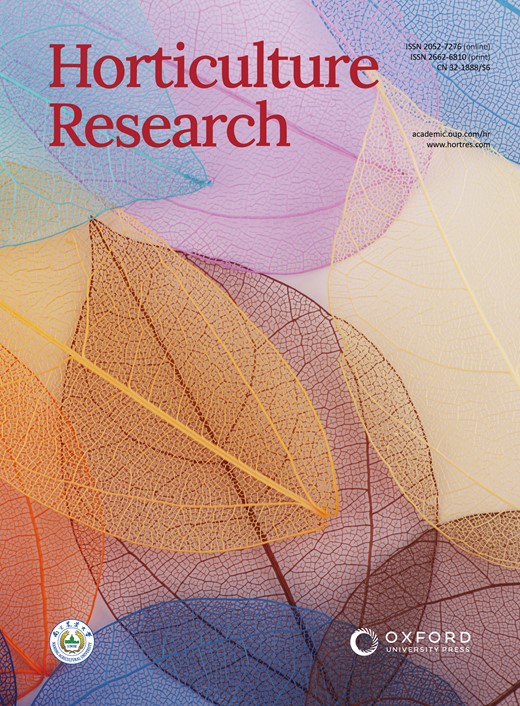一种液泡转化酶基因 SlVI 可调节番茄的糖代谢、采后果实质量和抗逆性
IF 8.7
1区 农林科学
Q1 Agricultural and Biological Sciences
引用次数: 0
摘要
糖类是调节各种生长过程的信号分子,可增强植物对各种非生物和生物胁迫的耐受力。此外,糖还有助于肉质水果作物收获后的风味。迄今为止,人们对糖代谢的调控及其在植物生长、果实成熟、采后品质和抗逆性方面的影响仍不完全了解。在本研究中,我们研究了番茄中编码液泡转化酶的基因的作用,该基因可将蔗糖水解为葡萄糖和果糖。SlVI 在番茄果实成熟过程中特异表达。我们发现,过表达 SlVI 会导致叶片增大和提早开花,而敲除 SlVI 会导致果实中蔗糖含量增加、果实坚硬度增强以及采后果实对灰霉病的抗性增强。此外,在采后阶段,SlVI 基因敲除果实中的柚皮苷和总可溶性固形物含量显著增加。转录组分析表明,SlVI 基因敲除果实中的蔗糖积累引发了负反馈调节,导致对淀粉降解至关重要的 BAM3 和 AMY2 基因下调。此外,在 SlVI 基因敲除果实中,与细胞壁、角质、蜡质和类黄酮生物合成以及病原体抗性相关的基因上调。相反,参与细胞壁降解的基因在基因敲除果实中的表达水平下降。这些结果与采后品质和抗性的提高是一致的。我们的研究结果不仅为番茄果实蔗糖含量与采后果实品质之间的关系提供了新的见解,还为提高果实品质和延长采后货架期提出了新的策略。本文章由计算机程序翻译,如有差异,请以英文原文为准。
A vacuolar invertase gene SlVI modulates sugar metabolism and postharvest fruit quality and stress resistance in tomato
Sugars act as signaling molecules to modulate various growth processes and enhance plant tolerance to various abiotic and biotic stresses. Moreover, sugars contribute to the post-harvest flavor in fleshy fruit crops. To date, the regulation of sugar metabolism and its effect in plant growth, fruit ripening, postharvest quality and stress resistance remains not fully understood. In this study, we investigated the role of tomato gene encoding a vacuolar invertase, hydrolyzing sucrose to glucose and fructose. SlVI is specifically expressed during the tomato fruit ripening process. We found that overexpression of SlVI resulted in increased leaf size and early flowering, while knockout of SlVI led to increased fruit sucrose content, enhanced fruit firmness, and elevated resistance of postharvest fruit to Botrytis cinerea. Moreover, the content of naringenin and total soluble solids was significantly increased in SlVI knockout fruit at postharvest stage. Transcriptome analysis showed a negative feedback regulation triggered by sucrose accumulation in SlVI knockout fruit resulting in a downregulation of BAM3 and AMY2, which are critical for starch degradation. Moreover, genes associated with cell wall, cutin, wax, and flavonoid biosynthesis and pathogen resistance were upregulated in SlVI knockout fruit. Conversely, the expression levels of genes involved in cell wall degradation were decreased in knockout fruit. These results are consistent with the enhanced postharvest quality and resistance. Our findings not only provide new insights into the relationship between tomato fruit sucrose content and postharvest fruit quality, but also suggest new strategies to enhance fruit quality and extend postharvest shelf life.
求助全文
通过发布文献求助,成功后即可免费获取论文全文。
去求助
来源期刊

Horticulture Research
Biochemistry, Genetics and Molecular Biology-Biochemistry
CiteScore
11.20
自引率
6.90%
发文量
367
审稿时长
20 weeks
期刊介绍:
Horticulture Research, an open access journal affiliated with Nanjing Agricultural University, has achieved the prestigious ranking of number one in the Horticulture category of the Journal Citation Reports ™ from Clarivate, 2022. As a leading publication in the field, the journal is dedicated to disseminating original research articles, comprehensive reviews, insightful perspectives, thought-provoking comments, and valuable correspondence articles and letters to the editor. Its scope encompasses all vital aspects of horticultural plants and disciplines, such as biotechnology, breeding, cellular and molecular biology, evolution, genetics, inter-species interactions, physiology, and the origination and domestication of crops.
 求助内容:
求助内容: 应助结果提醒方式:
应助结果提醒方式:


